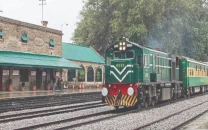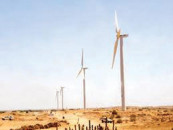PTI govt removes cost cap on projects
Eases policy for gas supply schemes to be executed under SDG programme

The government has eased the expenditure policy and scrapped the upper cap on the cost of politically motivated gas supply schemes, which will be undertaken under the Sustainable Development Goals Achievement Programme (SAP).
This comes in the backdrop of gas shortage in the country that has put a burden of Rs73 billion due to diversion of imported liquefied natural gas (LNG) to domestic consumers to bridge the shortfall in locally produced natural gas.
In the past two winter seasons, the government injected the expensive imported gas into the system and diverted it to domestic consumers. It has not been able to recover the outstanding Rs73 billion due to the absence of a mechanism in that regard.
The Petroleum Division prepared a summary in June 2019, seeking amendments to SAP guidelines. The federal cabinet approved the summary in September 2019 and also enhanced the cost ceiling for gas supply schemes under SAP to Rs300 million.
In a recent meeting, the cabinet relaxed the cost limit and permitted the public gas utilities to undertake gas supply projects of higher costs.
Sources told The Express Tribune that the Petroleum Division pointed out that the cabinet in its meeting held on February 21, 2019, while approving the constitution of a steering committee for SAP, approved guidelines and terms of reference with specific focus on schemes of a few sectors.
These areas included education, health, clean drinking water, farm-to-market roads, gas (missing infrastructure, subject to availability of gas, duly certified by the Petroleum Division), electricity and interventions leading to SDGs.
Under the guidelines, the request for financing of a gas supply scheme will be forwarded to the district commissioner (DC) or the District Coordination Officer (DCO) concerned for processing.
The DC/DCO will forward the request to the executing agencies concerned for technical feasibility and cost estimates. The proposal will then be submitted to the competent forum such as the Departmental Development Working Party, Provincial Development Working Party or Central Development Working Party for approval.
The schemes approved by the competent fora will be presented for financing and approval by the steering committee. Alternatively, the schemes received by the Cabinet Division may also be forwarded to the respective approving fora.
Administrative approval should include the following: The scheme is feasible and in public interest. No other executing agency has undertaken or is undertaking the same scheme in the area.
Operation and maintenance, and recurring costs will be borne by the provincial local government concerned. If the scheme is not started within two months of the date of issuance of administrative approval, funds will be immediately surrendered to the federal government or the Cabinet Division.
The Petroleum Division submitted a summary on August 6, 2019 for amendments to the SAP guidelines. The cabinet approved the summary on August 9 with the modification that the cost limit for undertaking gas supply schemes under SAP would be enhanced to Rs300 million.
The Petroleum Division, however, sought the cabinet’s nod for easing the Rs300-million cost ceiling to enable public gas utilities - Sui Northern Gas Pipelines Limited (SNGPL) and Sui Southern Gas Company (SSGC) - to undertake projects of higher costs.
The cabinet considered the summary titled “Implementation of Gas Development Schemes under Sustainable Development Goals Achievement Programme” dated July 27, 2020, submitted by the Petroleum Division, and approved the proposal.
Published in The Express Tribune, August 14th, 2020.
Like Business on Facebook, follow @TribuneBiz on Twitter to stay informed and join in the conversation.


















COMMENTS
Comments are moderated and generally will be posted if they are on-topic and not abusive.
For more information, please see our Comments FAQ